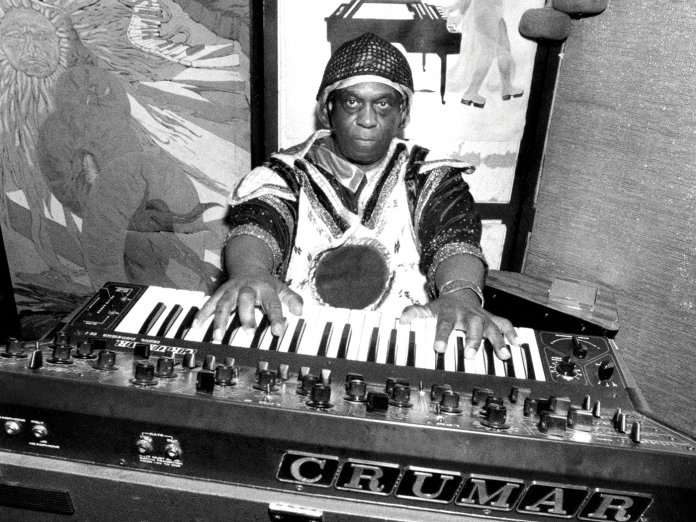The night before recording their 1978 album Lanquidity, Sun Ra and his Arkestra filmed a brief live spot for Saturday Night Live. Given a window of only four minutes, Sun Ra crammed three classics into the performance: Space Is The Place, The Sound Mirror, which featured a typically cosmic monologue from Ra himself, and Watusa. With their membership in double figures, the Arkestra couldn’t help but look cramped on the small SNL stage, but the kaleidoscopic whirl they brought to America’s TV sets – spinning dervish dancers, multicoloured robes and shawls, glittering headdresses – still feels uncontainable, even watching four decades later on a low-resolution upload of grainy VHS.
- ORDER NOW: The July 2021 issue of Uncut
This appearance on SNL, and the subsequent Lanquidity sessions, came after a few years of international exploration for the Arkestra. In 1977 they travelled to Lagos for the FASTEC festival (the World Black and African Festival of Arts and Culture), where Sun Ra refused a visit to Fela Kuti’s nightclub; on their way back home, they toured Egypt again. In 1978, Sun Ra also took a quartet to Italy for a brief tour. As John Szwed notes in his book Space Is The Place, Sun Ra had also started to focus on solo piano, at the urging of fellow pianist Paul Bley, resulting in some of the former’s most idiosyncratic, surprising recordings.
Lanquidity, though, feels like a particularly emboldened album in Sun Ra and the Arkestra’s history. If you come to it expecting the mystical free-jazz blowouts of ’60s classics like Heliocentric Worlds and Atlantis, you might be taken aback by the slack groove of the five songs here, the group vamping on riffs that draw from funk and R&B. The strangeness in Lanquidity works at a cellular level – at no point does anything feel like ‘business as usual’, even as this album, and some of its immediate peers (see also the minimal, drum-machine grooves of Disco 3000), reference recent developments in music in a more concrete and codifiable manner.
The sessions themselves were typically Arkestran. Tom Buchler, the owner of Philly Jazz, the label that originally released Lanquidity, had travelled out to Germantown a few times to try and organise a deal with Sun Ra; he was met, instead, with Arkestra rehearsals and hours of Sun Ra’s cosmic philosophies. When they finally arrived at Blank Tapes, a studio run by Bob Blank, who’d soon become known for landmark productions with the likes of Arthur Russell, Lydia Lunch and James Blood Ulmer, Sun Ra immediately asked the studio technicians to pull down the pyramid they’d built over the mixing console: “You cannot harness this music,” he said. “I’m dealing with the omniverse.”
The label’s small budget meant the Arkestra only had one night to record what became Lanquidity. Never mind – the resultant album is one of the strongest, most affecting of the group’s ’70s run of albums, a time when they were in a particularly expansive mood. The title song opens the album with a gentle, lambent melody from the keyboards, soon picked up by a phalanx of wind instruments sighing in unison. Guitars are fed through echoplexes, rendering them pliable as plasma; the percussion is a slow martial stroll. At times it sounds a little like the roiling funk of Miles Davis’s He Loved Him Madly era, dialled down in intensity, eddying and swirling with understated psychedelic heft.
Lanquidity’s gentle radiance gives way to Where Pathways Meet, a slick strut that strikes out on a seesawing two-note brass riff, with a needle-sharp guitar spitting gobs of arpeggios around the song’s unrelenting groove. That’s How I Feel creeps into view, with Sun Ra tangling keyboard lines around exploratory sax, before Richard Williams’ bass propels the song, fixating on another simple yet deeply effective phrase to keep everything afloat. It’s here that you realise the album’s minimalism-with-variations, its deep focus, is its greatest achievement – the slow builds of these songs load them with tension, and as much as the title Lanquidity, with its portmanteau of “languid” and “liquidity”, suggests an almost fusion-y laid-back vibe, the Arkestra takes these songs to less peaceable places.
Lanquidity’s offhand edginess builds through Twin Stars Of Thence and There Are Other Worlds (They Have Not Told You Of). The former is astringent, sharp, riding a rhythm that’s as wobbly as a slinky sliding downstairs. Fractured yet funky, it’s no surprise Azealia Banks sampled it for Atlantis on her Fantasea mixtape. There Are Other Worlds… is peak Sun Ra, though, with a moon chorus of chanting voices swinging and swooping over suspended synth vamps, deconstructed blues piano, a waterlogged field reflecting the night stars. Surprising in both its funk-tionality and its underhand threat, Lanquidity is a psychedelic pleasure, the Arkestra at yet another peak.



